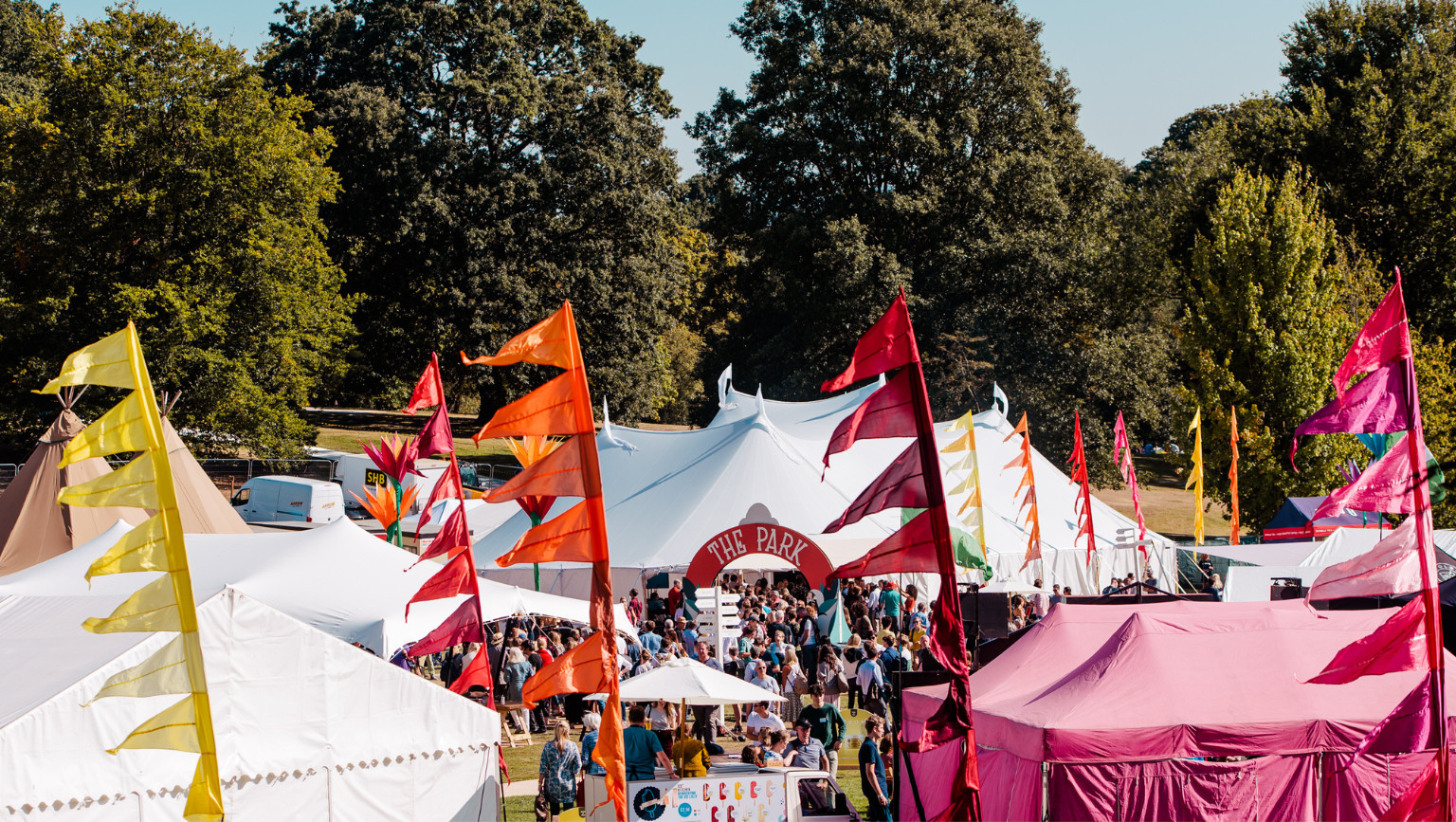
The Basement Gym + Studio opens in Camden Town
Camdenist readers get 50% off their first month’s membership, too

The world’s largest festival of philosophy and music is returning to Kenwood House, 1-2 October.
Camdenist readers get 20% OFF the price of all tickets. Just uses the code CAMDENIST20 at the checkout and we’ll see you there.
We didn’t start out trying to be important! At the time, philosophy was seen as something of a joke. It’s always struck me as bizarre that, particularly in British and North American culture, there’s this idea that we’ll leave big philosophical ideas to Parisian taxi drivers, whilst believing our feet to be more firmly on the ground. It seems ridiculous given that these are the things that really matter in our lives. We all have to decide what we’re doing, where we’re going, and what we think is right and wrong.
We wanted to help create a more engaged and active culture and to do the same thing with the university environment. We are all philosophers, whether we like it or not. There aren’t just an elite few who think about these things. Everyone is alive, and they’re having to cope with the strange experience that it is. We felt there should be a framework where everybody can contribute and hear other people that they find interesting and relevant to their lives.
The festival started in Hay, a beautiful place that runs alongside the glorious river. When we were looking at London, we wanted to try and find a space that had some of those elements. The amazing thing about Kenwood is that you’ve got no real idea that you’re in the middle of a city. It’s got a lot of beauty attached to it. It’s a spectacular location and enables people to escape from the normal urban hierarchies that otherwise dominate life.
Once upon a time in the 20th Century, we had a very simple idea of where we were heading… towards a better understanding and more truthful account of the world. Science was going to be the way we uncovered that. There was an upward picture of progress.
That high point of modernism was very influential, and to some extent it still is, but it was under attack from a growing awareness of the importance of perspective, of how any outlook embedded our own prejudices. This culminated in a postmodern end of the century.
Now we find ourselves in a situation where we can’t go back to the simplicities of modernism and say, We can have a simple account of objectivity that we can get to once and for all, nor are we very happy with a postmodern space when there’s an infinite variety of alternative perspectives. The challenge for philosophy, and indeed for all of us, is to think Where do we go from here? How do we move forward so that we are able to better engage with the world whilst accounting for what we’ve come to realise in the last 100 years of the importance of individual perspective?
My theory tries to provide a framework which makes sense of this situation where we can do all sorts of things but are unable to say how the world is definitively. It suggests that we regard the world as being open but that we’ve closed its openness with our language and thoughts and the way we go about things. That process of closure is what enables us to do things, it is the holding of something as something in particular.
If you imagine a baby, it is born into a situation where it doesn’t have ways of categorising the world. It doesn’t divide the world into people and chairs and objects and oranges and apples and so on. In being awash with everything, a baby is to some extent in openness. It is trying to make sense of all this flux and change. The baby learns to apply categories which enable it to intervene. It learns to distinguish food from not food, banana from not banana, giving it an advantage. There is no correct way to do that.
Instead of thinking that there is such a thing as a banana, the theory of closure suggests that we can hold this bit of openness as if it’s a banana, but actually, it’s all sorts of other things – it’s a bright yellow object, it’s a collection of atoms, it’s an example in a conversation… There’s no limit to the number of ways the baby could hold that bit of the world. We choose our categories as a means of making.

Absolutely. The desire to think that we might be right, in some definitive way, can be dangerous. A framework which enables us to see that our thoughts and our language and the way we interact with things are tools to try and get things to happen, rather than descriptors of an ultimate reality, might be a more productive framework for people to be operating in.
The framework that I’ve suggested is something I find myself working within but that isn’t to say that I’m not open to challenge. I think it’s very helpful for understanding both yourself and your circumstances and what’s going on in the world. It enables you to escape from many of the sort of anxieties and puzzles and troubles that that affect so many people.
The overall story I gave you earlier of saying once upon a time we were modernists and then we became post modernists and now we’ve got to work out how we can make sense of the world without assuming objectivity, whilst making changes that we think are valuable, is the biggest intellectual challenge. How do we go about doing that? It applies in almost every field. You have the same sort of questions. Where we’re actually going to be in 50 years’ time is something that, fortunately, we’re not able to see.
As a founder of the Institute of Arts and Ideas, you’re meant to think that you have some sort of grand plan, but we didn’t have one other than thinking culture should be different from the way that it is, people should be able to be more engaged in the big questions that affect their lives and education should be more vibrant, less stuck in frameworks that are decades out of date. As it’s developed, How The Light Gets In and the Institute of Art and Ideas were unexpectedly successful.
When we started, people said to me, no one’s ever going to go to a philosophy festival. But things have moved on and changed and increasingly universities are subscribing to our content. We are contributing to a global culture by trying to provide content that others can make use of, and hopefully find value in. In terms of what that means as an organisation, we would like to be in a situation where most universities recognise the strength of what we do, and that there aren’t really any other equivalents. Hopefully we’re also able to continue with growing our events and the initial vision of encouraging a more vibrant and engaged culture.
I don’t think I find being a philosopher frustrating. There are many things that are frustrating in a more general way. When I started out, I imagined that people would engage with ideas, that if they came across an interesting one, they might adopt it or reconsider their thinking or whatever. Over time, I’ve gradually realised that it’s a more complicated story. It’s often the case that people don’t engage with a new idea but stick with their current ways of going about things. I would like the world to be more open and more engaged. If I have a frustration it is that it isn’t. It’s very stuck in closures. It’s can be hard to break through that.
Maybe I don’t see it as a series of lessons but as a spectacular adventure. The thing is to make the best of the adventure and never to think that you’ve worked it out. To be constantly thinking actually, maybe there’s a better way to do this, a more interesting way to do this. Or maybe somebody else has got things that I need to learn from them. A lesson makes it feel as if you’re told what to think and that’s it. There aren’t lessons, there’s just a constant adventure, and an attempt to try and do things more interestingly or more thoughtfully, or more effectively.
Hear from more fascinating speakers here.
The world’s largest festival of philosophy and music is returning to Kenwood House, 1-2 October.
Camdenist readers get 20% OFF the price of all tickets. Just use the code CAMDENIST20 at the checkout and we’ll see you there.

Camdenist readers get 50% off their first month’s membership, too

A brand new hairdressing and barbering academy has landed in Camden Town and is now seeking style-conscious models and enthusiastic trainees

We speak to founder, Sol, about bringing the studio to Kentish Town

Explore the neighbourhood’s brand new neighbourhood